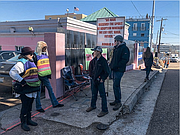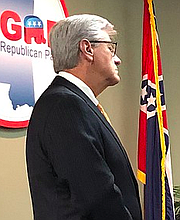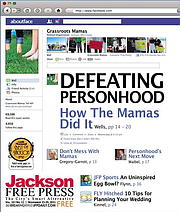Thursday, May 23, 2019
Former state Sen. Gloria Williamson of Philadelphia, Miss., shared a story about a failed pregnancy that nearly killed her in 1963. She told the story at an abortion rights rally outside the Mississippi State Capitol building on May 23, 2019. Photo by Ashton Pittman.
JACKSON—In 1963, a doctor in Jackson told Gloria Williamson that something was wrong with her pregnancy. Almost all forms of abortion were illegal in Mississippi back then, though, and her doctors did nothing. For two more months, the 19-year-old native of Philadelphia, Miss., carried a fetus whose cries she knew she would never hear.
To get a legal abortion, her doctor told her, three other doctors would first have to examine her at Baptist Memorial Hospital in Jackson. That was just ahead of the Fourth of July weekend, and before her planned exam the next week, she began hemorrhaging and nearly bled to death.
"I was put on hold for two months to have a (legal abortion), but my baby was dead, and they didn't care," Williamson told a gathering of abortion-rights supporters on Tuesday. "They did not care one iota that I was 19 years old and fixin' to die."
The Pink House Deals With 'Heartbeat Bill' Fallout
"Jesus loves you, mommy. Mommy, please don't kill me," a child's voice pleads from a large speaker system outside Mississippi's last abortion clinic, which is known among its defenders as "The Pink House."
The fetus had been dead for some time, and gangrene was setting in. At the emergency room, doctors cauterized her uterus with no anesthesia. But even to have the emergency procedure necessary to save her life, Williamson's mother had to first drive from Philadelphia to Jackson and sign papers.
'Your Children and Grandchildren Will Die Because of This'
Williamson, her voice still hoarse from a recent bout of bronchitis, shared that story through a bullhorn on Tuesday with a crowd of about 200 people gathered outside the Mississippi State Capitol building. There, Williamson served as a state senator from 2000 to 2007, and just two months ago, Gov. Phil Bryant sat in its rotunda and signed a law that, if enacted, would ban nearly all abortions after six weeks of pregnancy.
"Your children and grandchildren will die because of this," she told the crowd, recalling how difficult even legal, life-saving abortions were to get in 1960s Mississippi.
In Mississippi, though, pregnant women already die at higher rates than in most of the country, and the state is near the top in infant mortality.
In April, the Mississippi Department of Health, or MSDH, released its annual report on maternal mortality, showing that, from 2013 to 2016, there were 22.1 maternal deaths per 100,000 live births. That puts Mississippi at No. 15 in maternal mortality, just ahead of Florida. Louisiana and Georgia, which passed their own near-total abortion bans recently, boast the highest maternal mortality rates in the country.
Even so, Mississippi's maternal mortality rate remains above the national average of 18 maternal deaths per 100,000 live births. Mortality is significantly higher among black women in the state, at 51.9 deaths per 100,000 live births. Mississippi has the largest African American population by percentage of any state.
'A Disturbing Racial Disparity'
The report does show a drop in pregnancy-related deaths, though, down from a little more than 40 deaths in both 2013 and 2014, to 27 in 2015 and 26 in 2016. The Jackson Free Press called MSDH for comment for this story, and perinatal consultant Charlene Collier (perinatal refers to around the time of birth) responded with a statement on May 13.
"Since the last report, the pregnancy-related mortality appears to be lower than in past years, which is a good thing," Collier said in the statement. "However, we are still seeing a disturbing racial disparity. Mississippi's incidence of maternal death is still 20% higher than the United States pregnancy-related mortality rate."
MSDH cannot pinpoint "any single reason" for the decrease since 2013, she said, because maternal deaths are rare enough to make trend analysis difficult. However, she did note that some women in Mississippi have gained health benefits since the late 2013 implementation of subsidized health-care options through the Affordable Care Act's federal exchanges.
Mississippi: The Battleground for Roe v. Wade’s Future?
Red states, emboldened by the Trump regime, are passing hardline anti-abortion laws aimed at triggering a reconsideration of Roe at the nation's highest court—laws like the fetal heartbeat bills the Mississippi House and Senate passed on Feb. 13.
"More women have health insurance in Mississippi due to the exchanges in Mississippi, and women that are healthier when they enter pregnancy have a better chance of having good outcomes during that pregnancy," she said.
Medicaid Expansion Could Help
In 2012, the Supreme Court ruled that states could opt out of expanding Medicaid, a key part of the Affordable Care Act. Many Republican-controlled states, including Mississippi, did so, with Gov. Phil Bryant refusing billions in Medicaid expansion funds under former President Barack Obama's signature law.
That decision left about 300,000 Mississippians with no affordable health-care options, either because they made too much for traditional Medicaid or too little to qualify for ACA subsidies.
A future Mississippi governor could still decide to accept those funds and expand Medicaid, though, as Louisiana Gov. John Bel Edwards, a Democrat, did after voters elected him in 2015 to replace outgoing Republican Gov. Bobby Jindal.
Expansion could help further cut the maternal mortality rate, Collier suggested in her statement to the Jackson Free Press.
"Mississippi did not expand Medicaid, so there may be additional opportunities to provide primary health care to women before and after they have their babies so that they can better manage the medical conditions that often lead to pregnancy complications like uncontrolled hypertension and diabetes," she said.
The report found that around 19% of pregnancy-related deaths involved cardiovascular conditions or hypertension. During the 2013 to 2016 time period studied, black women accounted for 80% of pregnancy-related cardiac deaths.
'We Let Babies Get Born, Then They Die'
While debate over the six-week ban was ongoing in February, state Sen. Joey Fillingane, R-Sumrall, told a group of committee members that black women were the most likely to have abortions.
State abortion-rights leader Laurie Bertram Roberts fired back, telling the Jackson Free Press that anti-abortion legislators should focus on issues like maternal mortality and the infant mortality rate if they want to prove their commitment to life.
Gov. Phil Bryant Calls Abortion ‘Black Genocide’' in Defense Hyde-Smith
Gov. Phil Bryant said black women are committing "genocide" when they get abortions in a bizarre defense of Sen. Cindy Hyde-Smith's "hanging" remark.
"It's very easy to shame black women and black motherhood," she said at the time. "It's one of Mississippi lawmakers' favorite things to do, especially on the right. If they're not attacking black women for having abortions, they're attacking us for using SNAP benefits or TANF."
Roberts is the director of the Mississippi Reproductive Freedom Fund, the only such fund in the state that helps women pay for abortions.
When it comes to infant mortality, Mississippi sits at No. 1 as of 2017 figures, though Collier said MSDH will provide 2018 data next year. As with maternal mortality, African American infants are disproportionately likely to pay the price. MSDH will release an update on infant mortality in the state later this year, Collier told the Jackson Free Press on May 13.
At the rally outside the Capitol on Tuesday, Zakiya Summers, an African American woman who is the director of communications and advocacy at the Mississippi branch of the American Civil Liberties Union, tore into politicians for not making efforts to lower those numbers.
"But we can tell that politicians who are passing these laws don't care about that," she said.
Summers, who is also running for a legislative seat, urged the crowd to help elect politicians who share their beliefs. "We must use our civic duty and our constitutional responsibility to elect leaders who value women and who value families," she said.
Clinton resident Joedda Gore, who attended the rally with her mother, criticized conservative politicians for "manipulation of the abortion issue."
"Here's this red flag in front of the bull—abortion, abortion," she said. "No, the issue is, the babies are being born, but they die before they are 2 years old. Why can't we help the born? I think abortion is a shiny object. It gets a lot of votes, but it's not our issue. Our issue is that we let babies get born, and then they die."
In Governor's Race, Hood Punts; Reeves Calls Abortion 'Evil'
None of the top-tier candidates for governor in either party have come out against the heartbeat law, which bans abortions after a heartbeat is detectable, typically at six-weeks gestation.
Mississippi Attorney General Jim Hood, a Democratic candidate for governor, is defending the ban against a constitutional challenge in federal court. He has not said whether or not he personally agrees with this specific ban, but is generally anti-abortion.
Democrats, Activists 'Infuriated' as Hood Defends Six-Week Abortion Ban
Abortion-rights activists and some Democratic leaders are unhappy with Mississippi's leading Democratic candidate for governor, state Attorney General Jim Hood, after his office filed a brief in defense of the state's new six-week abortion ban.
"I've defended every bill the Legislature has passed on abortion. That's my duty as attorney general," Hood told reporters in February, adding that he does not "personally believe abortion is right."
He would not say whether he thought banning abortion at six weeks went too far, adding that he does not believe governors have the power to end abortion.
"The (United States) Supreme Court is going to make these decisions," he said. "It's not going to be the governor of the State of Mississippi. It's not going to be the Legislature. Now, they'll get out here and run and dupe people. It's awful to try to mislead good, church-going people who vote on one issue—mislead them, and tell them, 'I'm going to stop it, and we're going to do this, rah rah rah.' I'm not going to be that kind of governor."
Republican Lt. Gov. Tate Reeves, meanwhile, pushed for the law's passage in the Senate and proudly boasts his role in its passage. He is relying on support from conservative evangelical Christians to help him get over the finish line in the GOP primary and in the general election.
After a federal judge in Jackson heard arguments on Tuesday, Tate Reeves joined more than 150 pastors and anti-abortion activists in Byram.
"As I travel around Mississippi, the people that I talk to don't think that that is a decision. They believe that that is a murder," the lieutenant governor told supporters. "I've said it before, and I will say it again, abortion is evil. It is the greatest evil of our time. ... It is a moral issue. It is good versus evil, it is right versus wrong. This is not an issue for compromise."
True to his word, the bill Tate Reeves shepherded out of the Senate and to the governor's desk allows no exceptions for rape, incest or severe fetal deformities. That led one Republican woman, state Rep. Missy McGee of Hattiesburg, to cast the lone GOP vote against it in either legislative chamber.
Even before the Supreme Court declared abortion a constitutionally protected right in the 1973 Roe v. Wade ruling, back in the time when Williamson nearly died because of the difficulty of obtaining an abortion, Mississippi allowed abortions for rape victims.
U.S. District Court Judge Carlton Reeves will likely decide to block enforcement of the law before its enactment on July 1, setting up a fight in the 5th U.S. Circuit Court of Appeals in New Orleans that could possibly go all the way to the Supreme Court. Abortion opponents, including some state legislators, hope one of the recently-passed bans will trigger a U.S. Supreme Court case that could overturn Roe v. Wade.
At his campaign event Tuesday evening, Lt. Gov. Reeves called on those who believe that "lives are at stake" to "do something about it."
Study: More Abortion Restrictions Correlated With Higher Mortality
In 2017, Ibis Reproductive Health and the Center for Reproductive Rights, which is challenging Mississippi's latest ban in federal court, published a report that found that, overall, states with more abortion restrictions also had higher maternal mortality rates.
Of the 20 states with the highest maternal mortality rates between 2012 and 2016, Legislatures in seven, including Mississippi, have introduced or passed new abortion restrictions this year, including six heartbeat bans. Governors have signed five of those into law, and a sixth will likely become law now that Louisiana's governor has indicated he will sign the one in his state. Oklahoma, the only one of those seven states that did not pass a heartbeat bill this year, passed one in 2016, but its governor vetoed it.
Abortion Clinic Remains Open
Rep. Sam Mims says his clinic bill isn't about politics, but about protecting women.
Lawmakers in states with fewer abortion restrictions, the 2017 study found, were far more likely to pass legislation that mandates sex education and increases access to health care by doing things like strengthening family medical-leave laws and expanding Medicaid.
Both during his time as lieutenant governor and now as a candidate for governor, Tate Reeves has staunchly opposed Medicaid expansion, and decisively refers to it as "Obamacare expansion."
"I am opposed to Obamacare expansion in Mississippi. I am opposed to Obamacare expansion in Mississippi. I am opposed to Obamacare expansion in Mississippi," he chanted at members of the press in January, almost as if reciting an incantation.
Two of his Republican opponents, former Mississippi Supreme Court Chief Justice Bill Waller and state Rep. Robert Foster of Hernando, are campaigning in support of expanding Medicaid under the banner of "Medicaid reform"—a term used to distance themselves from the former Democratic president who remains a target for the ire of GOP voters. Foster co-sponsored the heartbeat law earlier this year.
When Hood announced his campaign for the Democratic nomination last fall, he strongly embraced expansion, and blamed Bryant's rejection of federal funds for the closure of rural hospitals like the one that shut down in his hometown of Houston, Miss., in 2014.
"We had an emergency room here in Houston my whole life, and now that the emergency room is closed," Hood said at his kickoff last October. "In 1940, we had better emergency health care in rural Mississippi than we have right now. That's insane."
Lack of Post-Birth Coverage Increases 'Risk of Maternal Death'
In the May 13 statement from MSDH, Collier suggested another change to Medicaid that could help reduce maternal mortality rates. Currently, Medicaid-eligible women can get coverage throughout their pregnancy and in the postpartum period, or 60 days after they give birth.
"They do not have comprehensive coverage after that six-week period, and this limits the capacity to better care for medical conditions that increase the risk of maternal death," Collier said.
How Personhood Failed in Mississippi
A Personhood initiative, which went far beyond banning abortion, failed in Mississippi. Who brought it down?
She pointed to a suggestion from the Mississippi Maternal Mortality Review Committee, or MMRC, in the April report. It calls on state leaders to extend that comprehensive coverage to a year.
"This would improve the ability to manage serious medical problems and could reduce maternal deaths due to cardiovascular disease and hypertension, which often happens after that six-week postpartum period," Collier said.
The report also calls on the state to expand access to mental health. Of the 136 women whose deaths MSDH looked at, 11% were the victims of either suicide or drug overdoses. The Legislature has done the opposite in recent years, cutting state funding for mental health rather than increasing it.
The Legislature established the MMRC in 2017. That, Collier told the Jackson Free Press, is allowing the department to gather more comprehensive information about maternal deaths and to "determine a more accurate picture of the causes of death and if the death was preventable."
Since 2014, MSDH's Mississippi Perinatal Quality Collaborative has been working with hospitals to put in place programs designed to curtail key causes of maternal deaths.
In 2011, Mississippi voters decisively defeated a Personhood initiative to ban abortion and several forms of birth control in the state. Bryant was chairman of that campaign in the state. In that same election, Mississippians made him governor and elevated Tate Reeves to lieutenant governor.
Follow State Reporter Ashton Pittman on Twitter @ashtonpittman. Send tips to [email protected].






